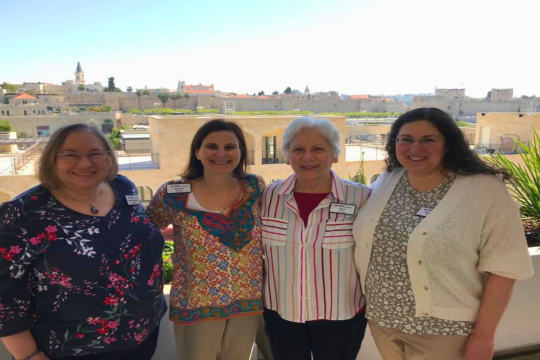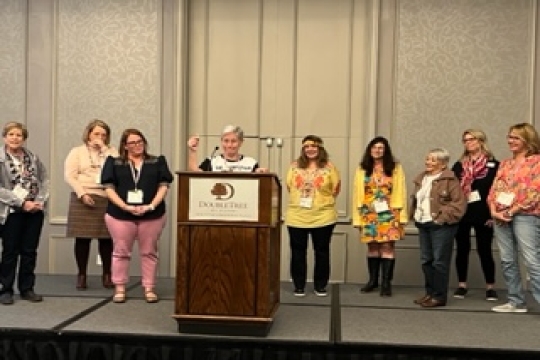
Kudos to all the Judaic shop mavens who have survived the 2020-21 pandemic! Many of the shop managers I’ve spoken with have schlepped merchandise home to sell out of their backyards or garages, erected tables and/or tents on synagogue property for “pop-up” mega-sales, used Facebook, Zoom, and FaceTime to create virtual in-store shopping, and employed other innovative in-store methods to get their wares before shoppers’ eyes.
With our synagogue properties closed to anyone other than staff, some shops provided curbside pickup and home delivery to congregants who shopped for specific items by way of pictures sent to their phones or computers. Rather than in-store sales, shops have rewarded customers for their patronage with discounts and GWPs (gift with purchase).
Now, as synagogues reopen and life splutters anew with more simchas returning to Temple (rather than, and in addition to, being live-streamed), classes start again, services take place—the question remains: What has been the impact of COVID on our business, and how do we see the future of Judaica shops within synagogues?
With synagogues closed this past year, our Judaica shops suffered a loss of revenue. Of course, we missed the income that gift shop profits provide to augment sisterhood’s ability to support its mission. Yet, gift shop closure has not been quite as detrimental to the financial well-being of our sisterhoods as it sounds because overall synagogue closures reduced the demand for sisterhood funds to support in-synagogue activities.
Perhaps the biggest impact will be the loss of volunteers. After 14 months of NOT volunteering in the gift shop, many volunteers have moved on to other projects, interests, and outlets. The question is both how to get them to come back, and how to attract new volunteers. Otherwise, with fewer volunteers, many of our shops are going to have to re-evaluate their hours of operation. It thus behooves shop managers to consider how best to re-recruit former volunteers and to entice new people to take on the rewarding opportunities gift shop service offers.
Another regrettable result of COVID is the impact on our vendors. While volunteer-run gift shops can continue existing without opening for business—what about our suppliers? If we haven’t bought new merchandise for a year, or bought very minimally—how have they fared? Our beloved Gary Rosenthal has closed. Eretz is no more. Zion Judaica and AVIV Judaica are now one. How many others are we going to find are no longer with us?
The pandemic also accelerated a trend that had been impacting the Arts and Craft Shows and Gift Shows where we used to be able to find a wide diversity of Judaica. Buyers who take on the expense of going to New York have been aware that for the last several years the NYNow Javitz Center Gift Show has been shrinking. The vendors who do attend contract for less space or share with another vendor to cover the cost. Fewer Israeli vendors attend due to the expensive booth fees, airfare, and hotel rates.
It will also be challenging to deal with the ever-increasing virtual wholesale environment. To avoid the cost of printing and mailing, many vendors have stopped printing catalogs. Shopping vendor items on their online sites can be time consuming, but it is imperative to take the time to compare prices among the different vendors with comparable items before placing online orders.
If you are running into similar problems, here are some recommendations:
- WRJ Sisterhood leadership needs to encourage volunteers from the membership and officers through constant reminders at functions, zoom activities, and communications
- Shop managers who work with customers that enjoy their experience shopping should offer them an opportunity to become a volunteer
- Volunteers need to be enticed with discounts for volunteering their time
- Judaica shop buyers must look for independent artists in their local areas who have been creating inspirational ritual items during quarantine
Of one thing we can be sure: the need for Judaic ritual items will continue to exist. Our challenge is to be able to meet the demand with the commitment to have the shop open reasonable hours. The shop must be staffed by trained personnel that are welcoming, knowledgeable, and eager to educate and serve customers. Gift shop buyers must have the foresight to ferret out Judaic artists and Jewish ritual items at the best quality and price available. By meeting these three goals, we will continue to thrive.
Kay Schachter is from Dallas, Texas a member of Temple Emanu-El. Kay has held many positions with WRJ TE Sisterhood, including as President 1993-1995 and 2016-18, and has been steering the Judaica shop for the last 24 years.
Related Posts
2ead.jpg)
My Not-So-Traditional Leadership Story

My Not-So-Traditional Leadership Story

